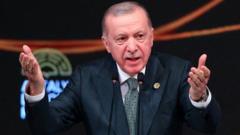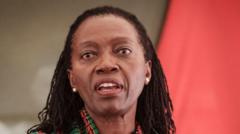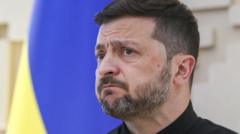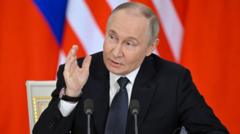Despite denials, Erdogan's remarks spark speculation about future political maneuvering in Turkey.
Erdogan Dismisses Claims of Constitutional Changes for Extended Presidency

Erdogan Dismisses Claims of Constitutional Changes for Extended Presidency
Turkey's leader insists proposed constitutional changes are not aimed at prolonging his tenure.
In a recent press conference, Turkish President Recep Tayyip Erdogan dismissed allegations that he is attempting to alter the constitution to extend his presidential term beyond 2028. Erdogan, who has been at the helm of Turkey for over two decades—first as prime minister from 2003 and then as president since 2014—asserted, “We want the new constitution not for ourselves, but for our country. I have no interest in being re-elected or running for office again,” aiming to quell rumors regarding his intentions as his current term approaches its end.
However, his statements have only intensified speculation about his long-term aspirations for power. In January, when asked about the possibility of running for another term, he playfully responded, “I am, if you are,” leading to revelations that discussions on this topic were occurring at his party's level, suggesting a possible interest in staying in power if public sentiment sways in his favor.
Despite his attempts to maintain public support, Erdogan is trailing in opinion polls behind opposition figure Ekrem Imamoglu, the mayor of Istanbul, who remains in jail following allegations of corruption—a charge he denies. Imamoglu's imprisonment has galvanized public support and ignited some of Turkey’s largest protests in recent years, as many perceive his situation as politically charged.
In an effort to quell dissent, Erdogan's administration has reportedly restricted Imamoglu’s social media presence while detaining members of his city administration on corruption suspicions, reflecting a tense political landscape. Erdogan, recognizing the need for a constitutional amendment to allow for potential re-election, argues that Turkey's current law—rooted in a military coup-era framework—lacks relevance in today’s fast-evolving world.
He maintains that changes are crucial for reflecting contemporary civilian voices—even though the constitution was amended after its initial drafting—and he has initiated dialogue about easing hostilities with the Kurdish militant PKK, potentially attracting support for a new constitutional framework from Kurdish allies.
Nonetheless, Erdogan faces substantial hurdles; to effectuate constitutional amendments, he would require support from 360 out of 600 parliamentary members but currently relies on only 321. Critics, including representatives from the opposition CHP party, maintain that Erdoğan's designed constitution prevents him from securing another presidential bid.
As political tensions simmer, the potential for changes in Turkey's leadership dynamics looms, hinging largely on both public sentiment and the fallout from upcoming political maneuvers.
However, his statements have only intensified speculation about his long-term aspirations for power. In January, when asked about the possibility of running for another term, he playfully responded, “I am, if you are,” leading to revelations that discussions on this topic were occurring at his party's level, suggesting a possible interest in staying in power if public sentiment sways in his favor.
Despite his attempts to maintain public support, Erdogan is trailing in opinion polls behind opposition figure Ekrem Imamoglu, the mayor of Istanbul, who remains in jail following allegations of corruption—a charge he denies. Imamoglu's imprisonment has galvanized public support and ignited some of Turkey’s largest protests in recent years, as many perceive his situation as politically charged.
In an effort to quell dissent, Erdogan's administration has reportedly restricted Imamoglu’s social media presence while detaining members of his city administration on corruption suspicions, reflecting a tense political landscape. Erdogan, recognizing the need for a constitutional amendment to allow for potential re-election, argues that Turkey's current law—rooted in a military coup-era framework—lacks relevance in today’s fast-evolving world.
He maintains that changes are crucial for reflecting contemporary civilian voices—even though the constitution was amended after its initial drafting—and he has initiated dialogue about easing hostilities with the Kurdish militant PKK, potentially attracting support for a new constitutional framework from Kurdish allies.
Nonetheless, Erdogan faces substantial hurdles; to effectuate constitutional amendments, he would require support from 360 out of 600 parliamentary members but currently relies on only 321. Critics, including representatives from the opposition CHP party, maintain that Erdoğan's designed constitution prevents him from securing another presidential bid.
As political tensions simmer, the potential for changes in Turkey's leadership dynamics looms, hinging largely on both public sentiment and the fallout from upcoming political maneuvers.






















